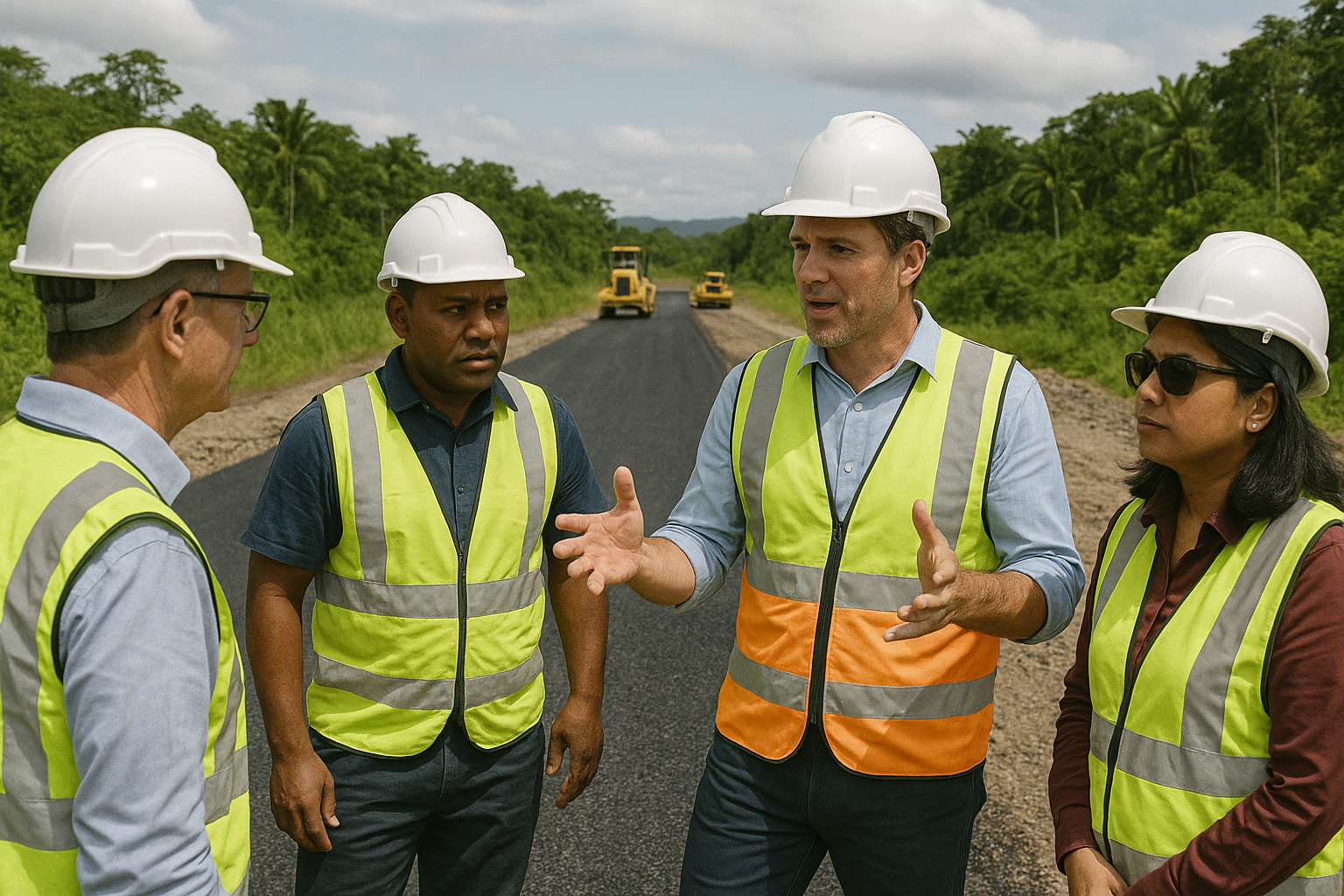Turning Waste into Roads: ADB and RMIT Propose Plastic Recycling for PNG Infrastructure
The ADB and RMIT study proposes using recycled plastic waste in Papua New Guinea’s road construction to tackle mounting pollution while enhancing infrastructure durability. It outlines a circular economy approach that improves climate resilience, reduces landfill use, and supports sustainable development.

The Asian Development Bank (ADB), in partnership with RMIT University, has presented a transformative solution to Papua New Guinea’s (PNG) mounting plastic waste crisis. Authored by ADB’s principal transport specialist, Syed Hussain Haider, and RMIT professor Filippo Giustozzi, the report explores how recycled plastic waste can be used to enhance the country’s road infrastructure. Focused initially on Port Moresby, the capital city, the study proposes a circular economy approach where waste is repurposed as a construction asset. PNG generates an estimated 155,000 tons of plastic waste annually, much of which ends up in overflowing landfills or the natural environment. The report argues that integrating plastic into road construction not only addresses this environmental hazard but also builds more durable roads suited to PNG’s hot and humid climate. With support from leading research institutes and government agencies, this initiative represents a bold step toward greener infrastructure development in the Pacific.
Plastic Pollution and Failing Infrastructure: A Dual Challenge
The study paints a stark picture of PNG’s waste management landscape. The Baruni Landfill in Port Moresby is already nearing capacity, struggling to handle the country’s rising plastic waste output. Most of the city’s informal settlements lack access to formal waste disposal services, resulting in plastic accumulation along roads, in waterways, and across forested areas. Informal waste pickers and limited private sector involvement, such as the Branis Recycling and Coca-Cola PET bottle recovery partnership, only scratch the surface of a much larger problem. The inefficiency in collection and the absence of recycling facilities mean nearly all waste is landfilled or dumped illegally. This not only affects marine and terrestrial biodiversity but also undermines public health and urban sanitation. Yet within this crisis lies a solution: reusing plastic waste in road construction, particularly under the Connect PNG initiative, which aims to build over 16,000 kilometers of road by 2040.
Roads Built for Resilience: The Case for Recycled Plastics
The paper highlights how the inclusion of recycled plastics, primarily polyethylene and polypropylene, enhances road strength, reduces wear, and improves climate resilience. Test results indicate improvements of up to 28% in pavement stiffness, 30% in rutting resistance, and 27% in fatigue resistance. These qualities are especially crucial in coastal PNG, where rising temperatures often lead to bitumen softening, and heavy rainfall causes flooding and erosion. Furthermore, plastic-modified asphalt reduces the use of bitumen, a fossil-fuel-based material with a high carbon footprint. Replacing part of it with recycled polymers helps cut greenhouse gas emissions and lowers the road’s life-cycle cost by reducing repair frequency. In urban centers like Port Moresby, where traditional asphalt roads deteriorate within 5–10 years, such innovation could double their lifespan. The added performance and sustainability of plastic roads make them a pragmatic and eco-friendly adaptation strategy.
Learning from the World: Global Success Stories and Lessons
Countries such as India, Australia, and the United Kingdom offer valuable precedents. India has constructed over 2,500 kilometers of roads using plastic-modified asphalt, but it still lacks national standards. Australia has taken a more structured approach, with national guidelines developed by Austroads and performance testing supported by the Commonwealth Scientific and Industrial Research Organisation (CSIRO). These standards consider not only performance but also environmental and health impacts such as microplastic leaching and high-temperature emissions, concerns often cited by skeptics. Case studies from these countries confirm that, with proper processing and oversight, recycled plastics pose minimal risk. Australia’s demonstration projects involving local councils and private companies show how public-private collaboration can fast-track innovation. The report urges PNG to learn from these successes, emphasizing the need for pilot testing, regulatory updates, and multi-stakeholder coordination.
A Blueprint for Action: Policy, Practice, and Pilots
The authors outline a phased roadmap starting with a pilot project in Port Moresby. The project would test locally sourced recycled plastics in asphalt under real conditions, offering data on durability, environmental safety, and economic performance. Initial steps involve establishing waste collection hubs, creating basic recycling infrastructure, and revising the national specifications for road and bridge works. Currently, these standards do not mention recycled plastics, crumb rubber, or other sustainable additives. Updating them to reflect modern practices is crucial for scalability. The study also recommends including communities and small enterprises in waste collection to create local economic opportunities. Recycled plastic roads would not only mitigate waste and extend infrastructure life but also contribute to employment and social development. With proper governance, this initiative could inspire similar projects across PNG and the Pacific.
- FIRST PUBLISHED IN:
- Devdiscourse
ALSO READ
ADB Approves $110M Loan to Modernize Gujarat's Workforce and Industrial Edge
Tremor Hits: 5.7 Earthquake Shakes Papua New Guinea
5.7 Magnitude Quake Jolts Eastern Papua New Guinea
ADB Approves $100M Aid Package to Support Recovery and Resilience in Myanmar
Pakistan's Economic Resurgence: Securing $1 Billion with ADB's Backing










